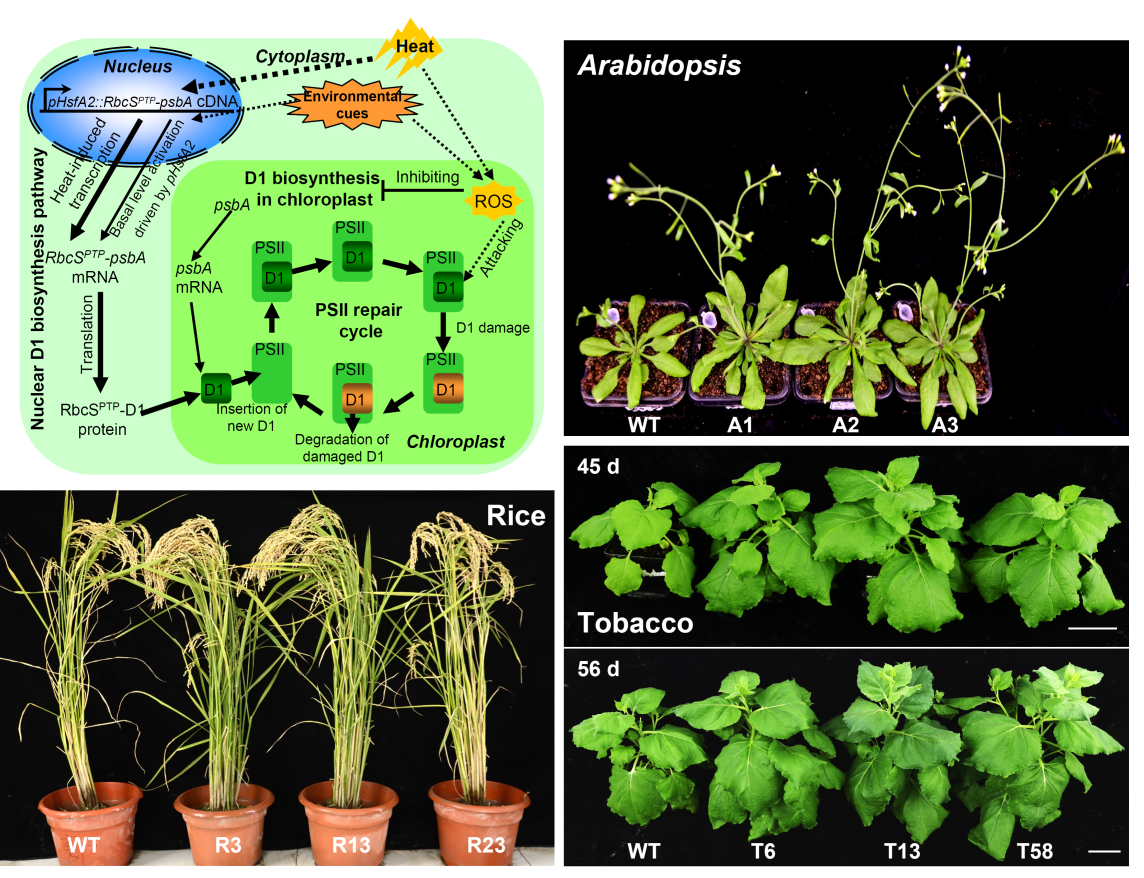Breakthrough in dealing with the food security challenges under global warming:Creating an nuclear-encoded synthesis pathway for the subunit D1 of PSII increases photosynthesis and crop yield
As a consequence of global warming, increasing temperature is a serious threat to crop production worldwide and may influence the objectives of breeding programs. In photosynthetic organisms, the photosystem II (PSII) complex is the primary target of thermal damage. Plants have evolved a repair process to prevent the accumulation of damaged PSII. The repair of PSII largely involves de novo synthesis of proteins, particularly the D1 subunit protein encoded by the chloroplast gene psbA. As an unavoidable consequence, the chloroplast produces a variety of reactive oxygen species (ROS) during photosynthesis. ROS repress the repair process of PSII by inhibiting the de novo synthesis of PSII proteins, primarily the D1 protein at the level of translation of the psbA mRNA. Given that the D1 protein plays a central role in the repair of PSII18, it is necessary to increase the rate of its synthesis in order to improve the repair efficiency of PSII and photosynthetic efficiency under heat stress.
Now a team of researchers led by Fang-Qing Guo, Ph. D, Principal Investigator at CAS Center for Excellence in Molecular Plant Sciences, Institute of Plant Physiology & Ecology, Chinese Academy of Sciences, report that the nuclear expression of the psbA cDNA driven by a heat-responsive promoter in the nuclear genome sufficiently protects PSII from severe loss of D1 protein and dramatically enhances survival rates of the transgenic plants of Arabidopsis, tobacco and rice under heat stress. Unexpectedly, we found that the nuclear origin supplementation of the D1 protein significantly stimulates transgenic plant growth by enhancing net CO2 assimilation rates with increases in biomass and grain yield. These findings represent an unprecedented breakthrough in bioengineering plants to achieve efficient photosynthesis and increase crop productivity under normal and heat stress conditions.
The study was published online on April 20, 2020 at 11:00 (US Eastern Time) in Nature Plants. Their findings represent a conceptually novel principle to enhance survival rate of plants by sustaining PSII activity under heat stress with creating a nuclear origin supplementation pathway of the D1 protein. They have demonstrated the actual effectiveness and sufficiency of this bioengineering strategy in enhancing plant thermotolerance using three model systems of monocot and dicot plant species, including Arabidopsis, tobacco and rice.
In agreement with increasing photosynthesis, aboveground biomass at harvest was significantly greater in the transgenic lines of Arabidopsis, tobacco and rice, and the increase ranges were 43.7-80.2% for Arabidopsis, 15.1-22.3% for tobacco and 20.6-22.9% for rice, respectively. In addition to aboveground biomass, grain yield of the transgenic rice plants significantly increased at the range of 8.1-21.0% when grown under field conditions and harvested at Songjiang, Shanghai, China and at the rice cultivation region of Southern China at Lingshui, Sanya, Hainan Province, China.
Over the last 50 years, global crop yield tripled and estimates suggest that a 70% increase in crop production is needed for global food demand by 2050. In general, Guo and his colleagues (Juan-Hua Chen and Si-Ting Chen as major contributors) have shown here that a conceptually novel bioengineering strategy can directly achieve efficient photosynthesis and increase crop productivity under normal and heat stress conditions. Their findings have provided an immediate and feasible resolution to boost plant biomass and crop productivity around the world, especially for helping crop plants survive more frequent and more severe heat waves under global warming situations, which has the great potential to contribute towards global food security in years to come.
This research was supported in parts by Chinese Academy of Sciences (the Strategic Priority Research Program, XDB27040105), the Ministry of Science and Technology of China (National Key R&D Program of China, 2016YFD0100405) and the National Natural Science Foundation of China.
URL for the article: https://www.nature.com/articles/s41477-020-0629-z

The nuclear origin supplementation of the D1 protein significantly stimulates transgenic plant growth by enhancing net CO2 assimilation rates with increases in biomass and grain yield.
Contact:
Dr. Fangqing Guo, Professor
National Key Laboratory of Plant Molecular Genetics, CAS Center for Excellence in Molecular Plant Sciences/Shanghai Institute of Plant Physiology and Ecology (SIPPE), Chinese Academic of Sciences
Tel: 86-21-54924098
Email: fqguo@sibs.ac.cn